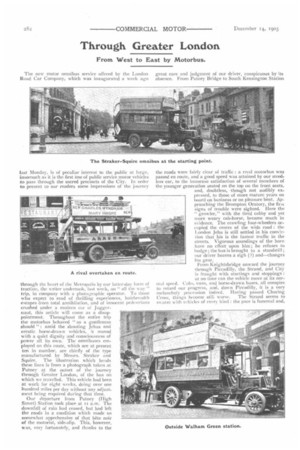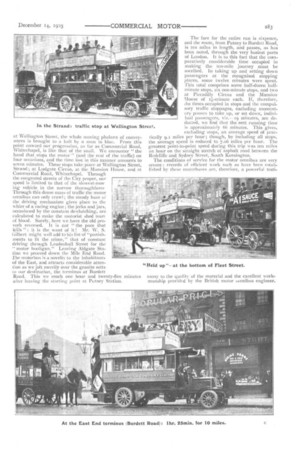Through Greater London
Page 4

Page 5

If you've noticed an error in this article please click here to report it so we can fix it.
From West to East by Motorbus.
The new motor omnibus service offered by the London great care and judgment of our driver, conspicuous by its Road Car Company, which was inaugurated a week ago absence. From Putney Bridge to South Kensington Station last Monday, is of peculiar interest to the public at large, Insomuch as it is the first tine of public service motor vehicles to pass through the sacred precincts of the City. In order to present to our readers some impressions of the journey through the heart of the Metropolis by our latter-day form of traction, the writer undertook, last week, an " all the way " trip, in company with a photographic operator. To those who expect to read of thrilling experiences, hairbreadth escapes .from total annihilation, and of innocent pedestrians crushed under a modern car of Juggernaut, this article will come as a disappointment. Throughout the entire trip the motorbus behaved "as a gentleman should " : amid the shouting Jehus and erratic horse-drawn vehicles, it moved with a quiet dignity and consciousness of power all its own. The omnibuses employed on this route, which are at present ten in number, are chiefly of the type manufactured by Messrs. Straker and Squire. The iilustration which heads these lines is from a photograph taken at Putney at the outset of the journey through Greater London, of the bus on which we travelled. This vehicle had been at work for eight weeks, doing over one hundred miles per day without any adjustment being required during that time.
Our departure from Putney (high Street) Station took place at 11 a.m. The downfall of rain had ceased, but had left the roads in a condition which made us somewhat apprehensive of that bête noir of the motorist, side-slip. This, however, was, very fortunately, and thanks to the
the roads were fairly clear of traffic : a rival motorbus was passed en route, and a good speed was attained by our steedless car, to the immense satisfaction of several members of the younger generation seated on the top on the front seats, and, doubtless, 'though not audibly expressed, to those of more mature years on board on business or on pleasure bent. Approaching the Brompton Oratory, the first signs of trouble were sighted. Here the " growler," with the tired cabby and yet more weary cab-horse, became much in evidence. The crawling four-wheelers occupied the centre of the wide road : the London Jehu is still settled in his conviction that his is the fastest traffic in the streets. Vigorous soundings of the horn have no effect upon him; he refuses to budge; the bus is brought to a standstill ; our driver heaves a sigh (?) and—changes his gear.
From Knightsbridge onward the journey through Piccadilly, the Strand, and City is fraught with startings and stoppings : at no time can the vehicle move at its normal speed. Cabs, vans, and horse-drawn buses, all conspire to retard our progress, and, down Piccadilly, it is a very melancholy prwession indeed. Having passed Charing Cross, things become still worse. The Strand seems to swarm with vehicles of every kind : the pace is funereal and,
at Wellington Street, the whole moving phalanx of conveyances is brought to a halt by a man in blue. From this point onward our progression, as far as Commercial Road, Whitechapel, is like that of the snail. We encounter " the hand that stops the motor" (and the rest of the traffic) on four occasions, and the time lost in this manner amounts to seven minutes. These stops take piace at Wellington Street, Strand; at Ludgate Circus, at the Mansion House, and at Commercial Road, Whitechapel. Through the congested streets of the City proper, our speed is limited to that of the slowest-mov ing vehicle in the narrow thoroughfares Through this dense mass of traffic the motor omnibus can only crawl ; the steady hum of the driving mechanism gives place to the whirr of a racing engine; the jerks and jars, occasioned by the constant de-clutching, are calculated to make the motorist shed tear: of blood. Surely, here we have the old proverb reversed. It is not "the pace that kills " : it is the want of it! Mr. W. S. Gilbert might well add to his list of "punishments to fit the crime," that of constant driving through Leadenhall Street for the "motor hooligan." Leaving Aldgate Station we proceed down the Mile End Road. rhe motorbus is a novelty to the inhabitants of the East, and attracts considerable atten
tion as we jolt merrily over the granite setts to our destination, the terminus at Burdett Road. This we reach one hour and twenty-five minutes after leaving the starting point at Putney Station.
The fare for the entire run is sixpence, and the route, from Putney to Burdett Road, is ten miles in length, and passes, as has been noted, through the very busiest parts of London. It is to this fact that the comparatively considerable time occupied in making the ten-mile journey must be ascribed. In taking up and setting down passengers at the recognised stopping places, some twelve minutes were spent. This total comprises some half-dozen halfminute stops, six one-minute stops, and two at Piccadilly Circus and the Mansion House of ti-minute each. if, therefore, the times occupied in stops and the compulsory traffic stoppages, excluding momentary pauses to take up, or set down, indivilual passengers, viz.--19 minutes, are deducted, we find that the nett running time is approximately 66 minutes. This gives, excluding stops, an average speed of prac
tically 9.1 miles per hour; though, by including all stops, the average speed is reduced to 7.06 miles per hour. The greatest point-to-point speed during this trip was ten miles an hour on the straight stretch of asphalt road between the Redcliffe and Sydney Street, South Kensington. The conditions of service for the motor omnibus are very severe : records of efficient work such as have been established by these motorbuses are, therefore, a powerful testi
























